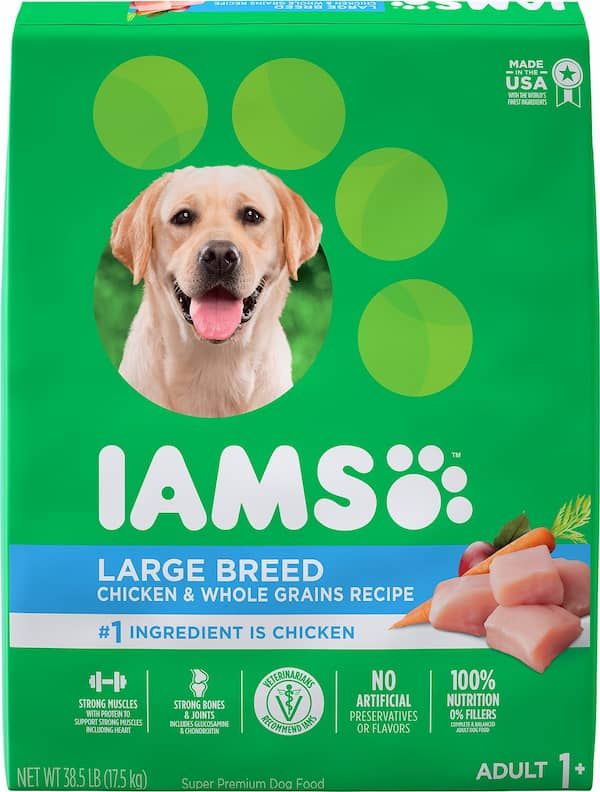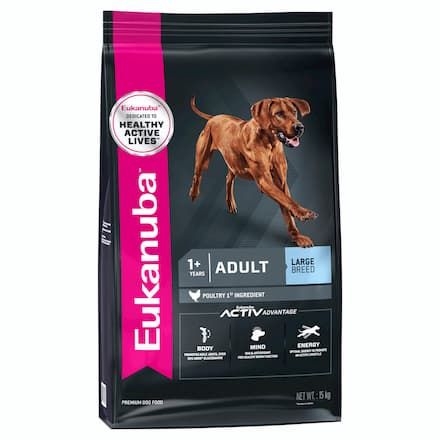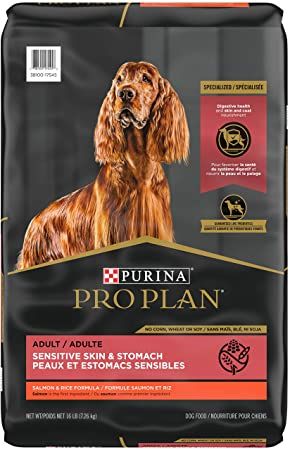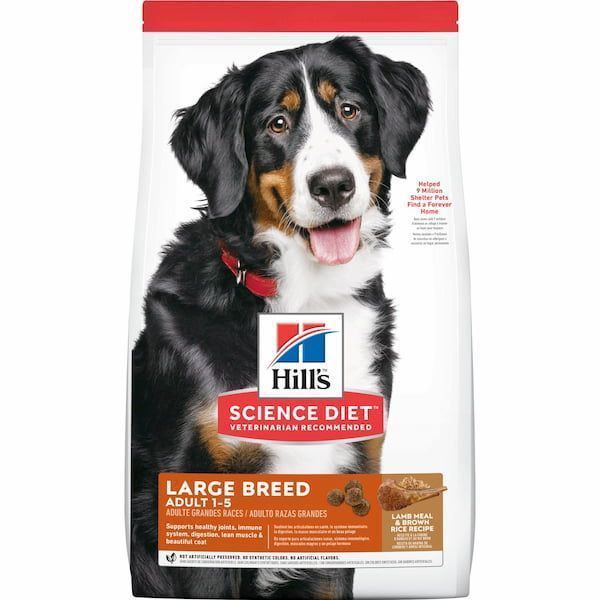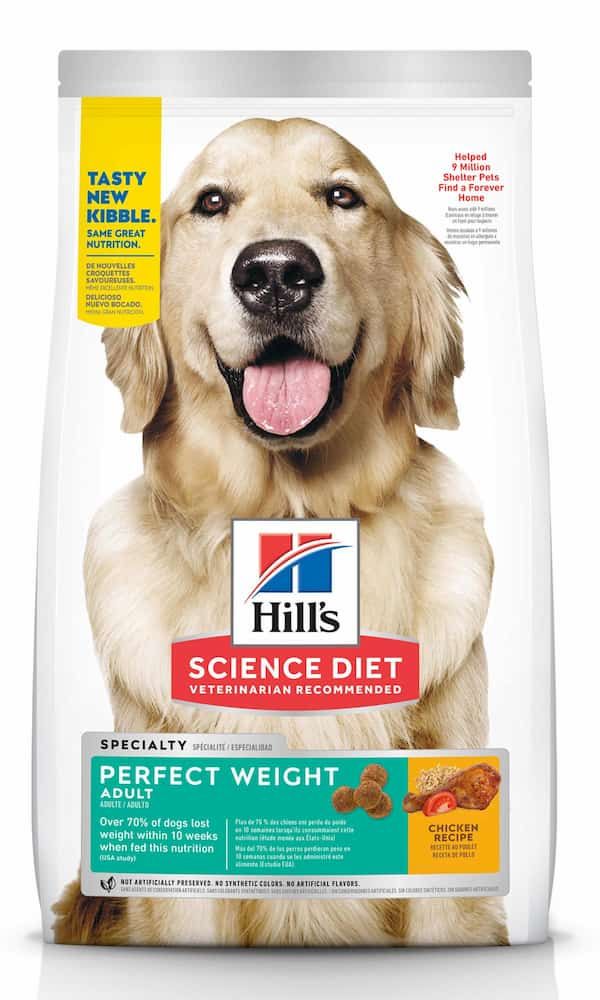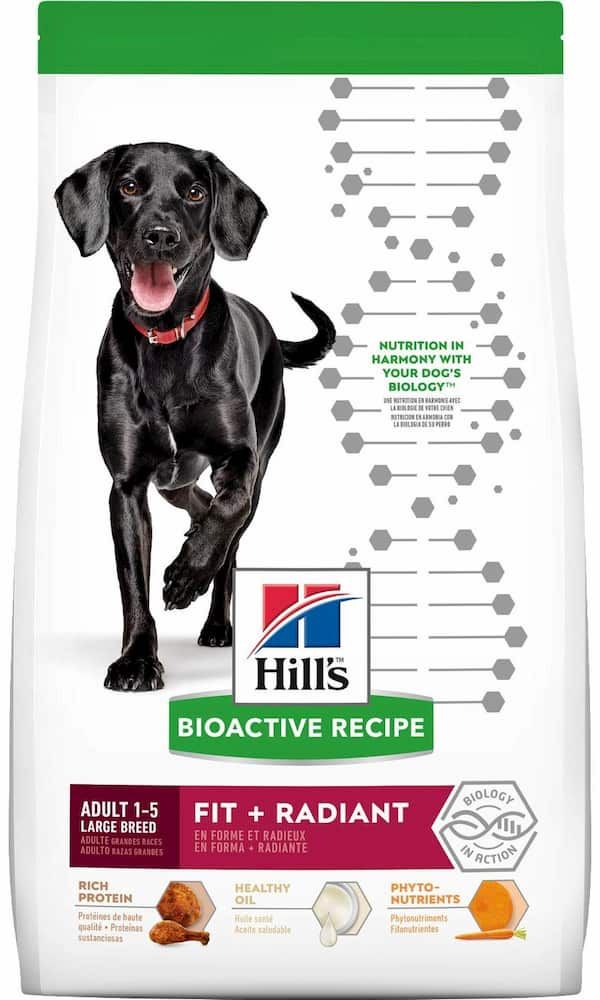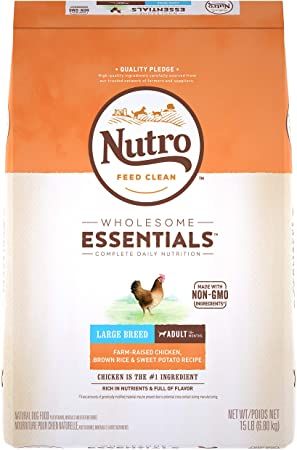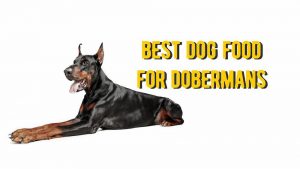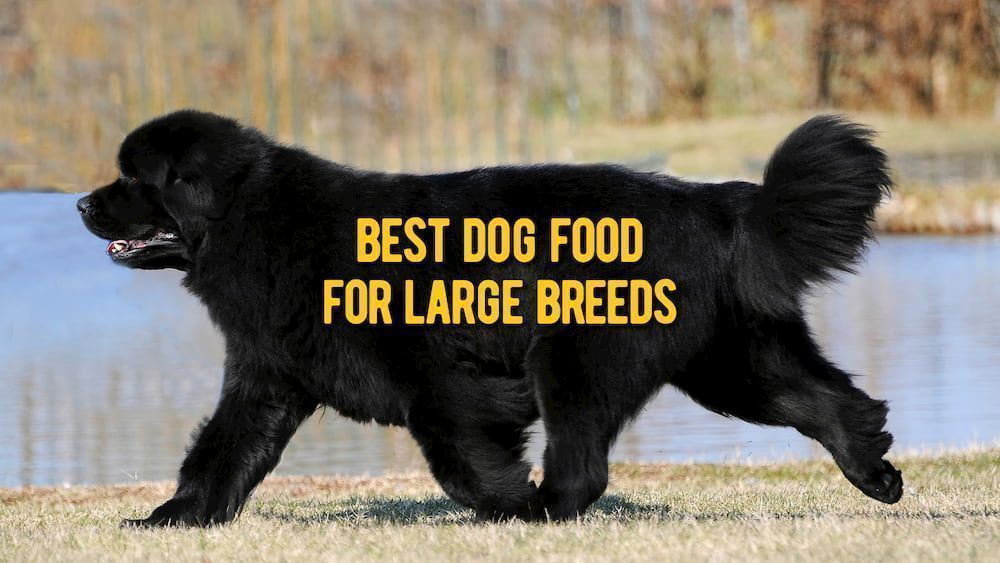
The nutritional requirements of dogs, especially large breeds, should be appropriately taken care of to avoid situations when they are overfed or poorly fed. Unfortunately, as there are many foods, it becomes cumbersome to get the right foods suitable for their consumption. It is also important to emphasize that large breeds have specific nutritional needs. If their dietary needs are met, then you are sure that they would boast of good well-being. Also, it is necessary to pay attention to your large breed’s health condition, and this involves consulting a veterinarian to assist in providing the right meal plan for your large breed.
Just as their name implies, large breeds are relatively large, and this presupposes that they are susceptible to many challenging health conditions as they age. Large breeds are expected to be fed with meals containing a high source of omega fatty acids and other supplements such as Glucosamine and Chondroitin. Many large breeds struggle with weight gain, which can harm their health. To this effect, large breeds are often affected by various health conditions such as high blood pressure, diabetes, arthritis, muscle atrophy, etc. They also require more attention as they age.
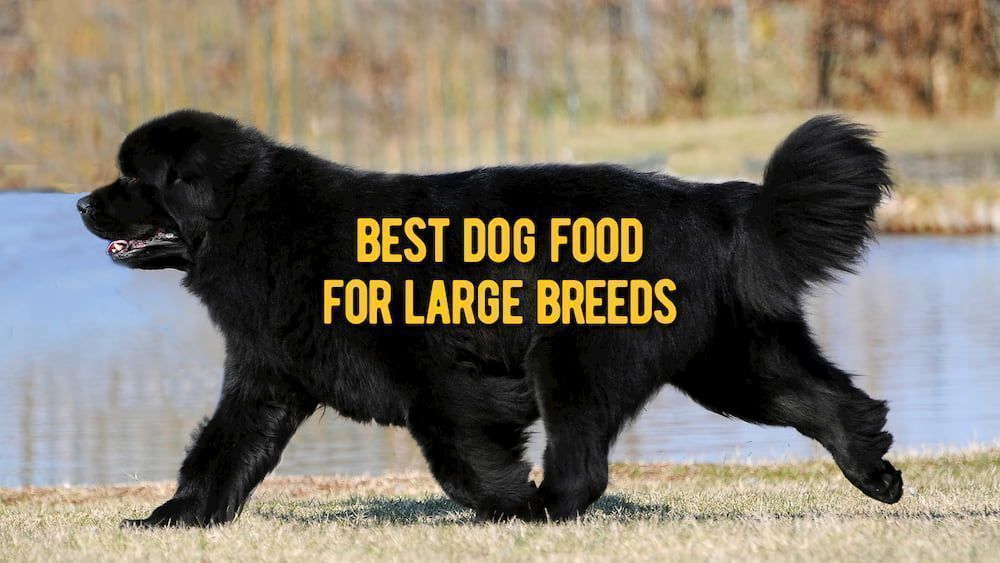

Our 3 Favorite Picks of Foods for Large Breed
In this article, the best products for these breeds, as suggested by a veterinarian, are discussed. It also contains insightful information that would serve as a guide to helping you treat your large breeds better. Do you want to be in the know? Read on!
|
Products |
Features |
Links |
|
Our TOP Pick 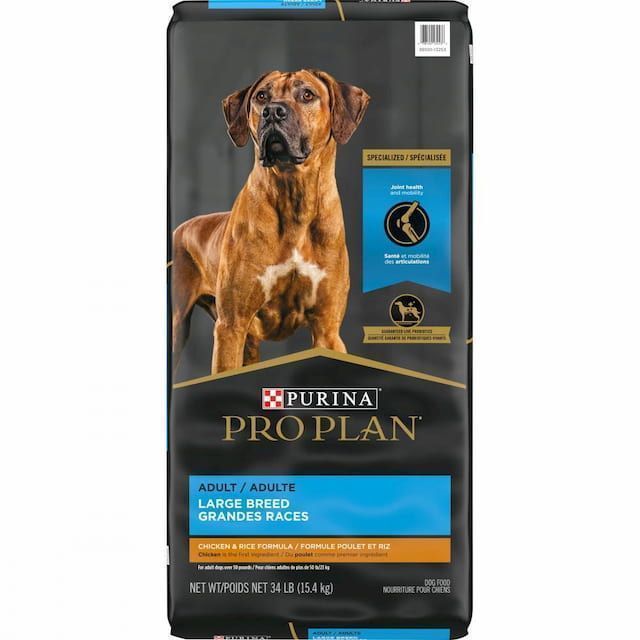
|
1. Purina Pro Plan Savor Adult Shredded Blend Large Breed Formula
|
|
|
Our Runner-Up Pick 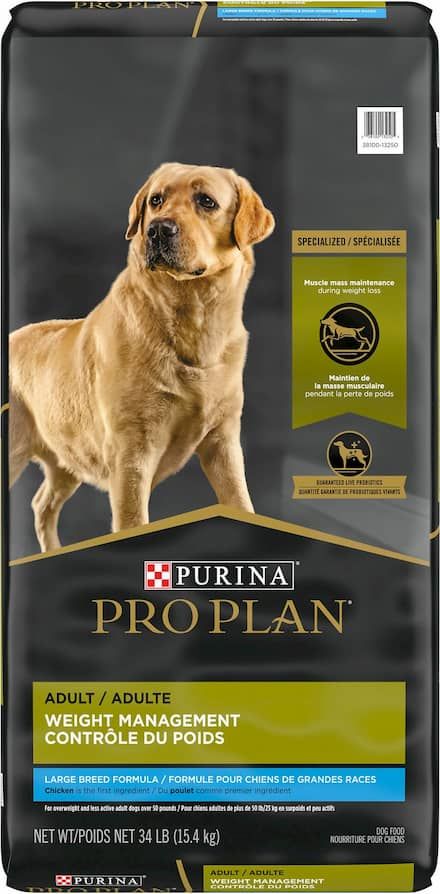
|
2. Purina Pro Plan Focus Adult Weight Management Large Breed Formula
|
|
|
Best Dry Pick 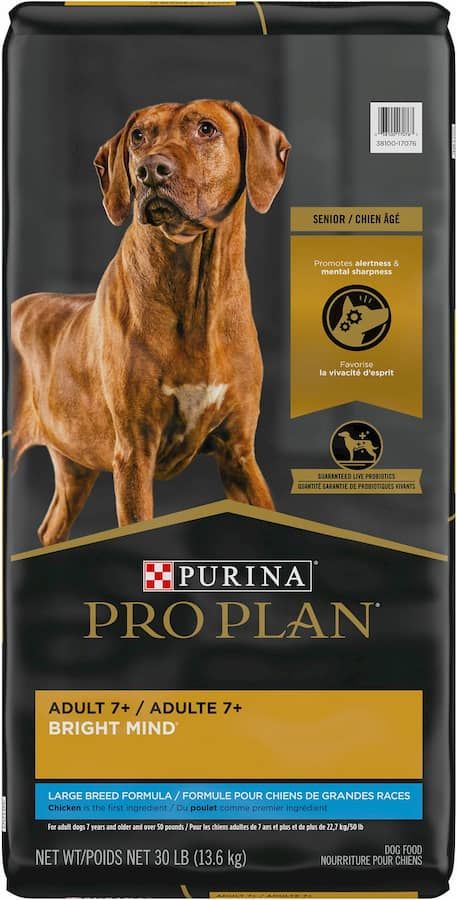
|
3. Purina Pro Plan Bright Mind 7+ Large Breeds
|
*Ratings are formed by the author of the article based on own research and combined with customer reviews.
The Best Dog Foods for Large Breeds (All Reviews)
1. Purina Pro Plan Savor Adult Shredded Blend Large Breed Formula
This meal is necessary to help dogs maintain a lean body and ideal weight. It also provides dogs with adequate protein and fat that is important for their health needs. In addition, it contains probiotics to support digestive health.
Features:
- Chicken & rice formula.
- Added probiotics.
- Chicken is the #1 ingredient.
Pros
Cons
- Builds healthy athletic build.
- Soft chunks of chicken in the food.
- Insufficient Omega oil.
2. Purina Pro Plan Focus Adult Weight Management Large Breed Formula
It is always important to ensure that dogs maintain ideal body weight. This product helps to stay fit and healthy while keeping an appropriate weight. Interestingly, it is easy to digest as such your pets would have less difficulty consuming them.
Features:
- It promotes digestive health.
- It contains omega 6 fatty acids for healthy skin.
- The presence of fiber in this meal helps to create intestinal balance.
Pros
Cons
- It is inexpensive and delivered at a great service.
- Most dogs enjoy eating this dog food.
- Not found.
3. Purina Pro Plan Bright Mind 7+ Large Breeds
Dog’s ages. You can still keep them active and in good health by feeding them with this product. It contains natural substances which nourish their mind while keeping them active and making them feel younger.
Features:
- Omega fatty acids to support joint health.
- Vitamin A for healthy skin.
Pros
Cons
- It helps to improve the performance.
- It is an enjoyable meal.
- It gives the dogs a younger appearance while making them stay active irrespective of age.
- It is also a great meal plan for epileptic dogs.
- Not found.
4. Iams proactive Health Adult Large Breed
This product is specifically designed for dogs that over one year and over 50 pounds. It contains essential nutrients that help to ensure that your pet enjoys healthy joint muscles. It also contains antioxidants that help to boost the immune system, and its crunchy texture protects the teeth from tartar.
Features:
- It contains natural ingredients.
- Essential nutrients for a longer life span.
- It is suitable for large breeds for a year or older.
- It is crunchy and this helps keeps the teeth of dogs free from tartar.
- It contains prebiotics that helps healthy digestion.
Pros
Cons
- It is lab approved.
- Impressive service delivery.
- It is inexpensive.
- Some pet owners complained that it gave dogs loose stools.
- Picky eaters might not be eating it well.
5. Eukanuba Adult Large Breed
If you want a balanced diet meal plan for your large breed, this product is what you need. It contains the necessary vitamins, minerals, fibers, carbohydrates, and proteins that are essential for repairing lean muscle mass. It also helps in the support of joints muscles.
Features:
- Chicken is the number one ingredient.
- It contains essential nutrients for well-being.
- Good quantity of fat that provides energy for your pet all through the day.
Pros
Cons
- Pets enjoyed this product.
- It is a dog-preferred brand.
- Some dogs refuse to eat properly after having a taste of this product
- Poor packaging of products
6. Purina Pro Plan Large Breed Sensitive Skin and Stomach
If your pets have a sensitive stomach, this is your go-to! It contains fiber which makes digestion very easy. In addition, this meal is prepared with simple carbohydrates that ensure your dogs do not experience discomfort in the stomach.
Features:
- It contains zinc to keep the skin healthy.
- It is produced without corn, wheat, or any artificial flavors.
- The chief ingredient is salmon.
- It contains oatmeal which is easily digested and great for sensitive stomach.
- Omega 3 helps to support joints.
Pros
Cons
- It is a suitable choice for dogs that struggle with allergies.
- It makes it easy to poo.
- It controls stomach upset.
- Gives certain dogs digestive problems.
7. Hill’s Science Diet Adult Large Breed
Your large breeds deserve nothing short of the best and this is only possible when you feed them with the right product. This product contains natural substances that contribute to the general well-being while ensuring that they are active and healthy.
Features:
- It supports immunity and strong health.
- It is adequate for nourishing the skin.
- It does not contain any preservatives.
- Chicken is the number one ingredient.
- It is flavored.
- It contains ingredients that support the development of joints.
Pros
Cons
- It is an excellent product.
- It leaves the dog happy.
- Poor delivery time.
8. Hill’s Science Adult Perfect Weight Large Breed
This is a delicacy that is crafted from protein to help your pet maintain lean muscles while also staying healthy. It is also an effective weight management plan.
Key Features:
- It helps maintain a healthy muscle weight.
- For weight management.
- It contains natural ingredients such as vitamins, minerals and amino acids.
Pros
Cons
- It is the right choice for dogs with a sensitive stomach.
- It is a good meal for weight management.
- Reduction in the Kibble size.
9. Hill’s Bioactive Recipe Adult Large Breed Fit + Radiant
It provides your large breeds with lean muscles and makes them look healthier. Also, it contains essential nutrients that ensure that your dog gets the required nutrient for proper development and well-being.
Key features:
- It contains a blend of ingredients for a healthy metabolism.
- Chicken is the chief ingredient.
- It is made with essential ingredients.
- It is easily digested.
Pros
Cons
- Helps to build muscles.
- It is made with natural ingredients.
- Not found.
10. Nutro Wholesome Essential Large Breeds
This product contains antioxidants that help to build the immune system. The presence of natural ingredients also helps to maintain the healthy bone function of your pet.
Key features:
- Chicken is the chief ingredient.
- It contains natural sources of ingredients.
- It contains vitamin E for healthy immune system.
- It is free from artificial flavors or preservatives.
Pros
Cons
- It is a suitable meal for dogs that are picky eaters.
- It is a great dog meal.
- Sometimes can affect allergic.
Expert advice on Large Breed Dogs Nutritional Needs
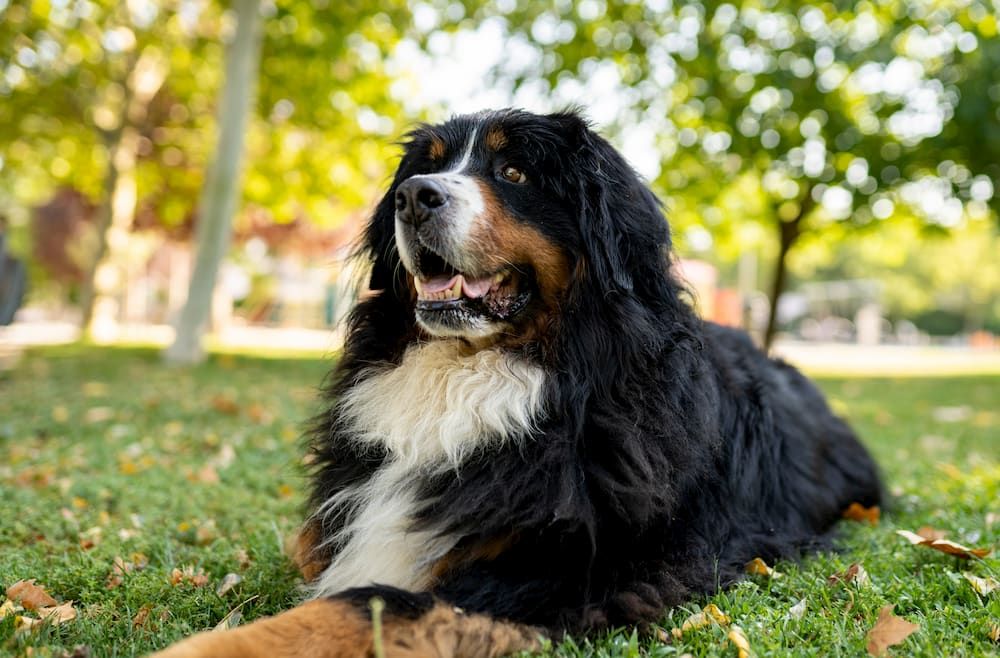

@user19205626 / FreePik
It is important to know what to look for when you go to purchase dog food for your large breed to meet their special nutritional needs. With so many brands and varieties out there, it can be extremely overwhelming and even stressful to find the best food for your big canine companion.
Remember that nutrition requirements are different for large breed puppies compared to adult large breed dogs. Similarly, large breed senior dogs also have specific nutritional needs.
A large or giant breed has special nutritional requirements to support their health and wellbeing. There may also be specific health considerations you want to consider when choosing the best product. Your veterinarian should be your first resource for finding the best diet for your pet if he or she has any specific health or nutritional needs.
Bone and joint health
- Your large breed dog is…large. That means that once they are full-grown, they have more weight-bearing on their bones and joints, especially if they are active or participate in sports. They are also prone to orthopedic conditions such as degenerative joint disease (also known as arthritis) and hip dysplasia. There is often a genetic role in these conditions that cannot be avoided, but you can help support your pet through their nutrition. Supplementing the musculoskeletal system is important and can be done by added omega fatty acids to the food, added glucosamine, and added chondroitin.
- Omega fatty acids — Omega 3 fatty acids, in particular, have anti-inflammatory effects and help to reduce inflammation in the body. They are also important for heart health, brain health, and support the skin and coat in addition to providing benefits for the joints. Some common fatty acids are EPA (Eicosapentaenoic acid) and DHA (Docosahexaenoic acid).
- Glucosamine and chondroitin — These are supplements that are known for being chondroprotective, meaning they protect the joints. Many large breed dog foods have glucosamine plus or minus chondroitin added in small amounts, typically from meat and poultry products such as poultry by-products or meals. These amounts are certainly beneficial, and you should choose a dog food that has this added benefit. However, your pet may need an additional glucosamine and chondroitin supplement as recommended by your veterinarian. This is especially true if they are already suffering from arthritis or have a history of joint or bone-related injuries and need extra mobility support.
Weight and obesity
- According to the Association for Pet Obesity Prevention’s 2018 study, approximately 55% of dogs are classified as overweight or obese. [1] This is especially hard on our large breed dogs simply due to their size. Adding extra weight can really be hard on their joints.
- If your dog is prone to weight gain, make sure to choose food that is specific for weight loss, weight control, or weight management. These foods will have a reduced fat content to limit fat gain and encourage weight loss. They will also have increased fiber content to make your pet feel full.
- A large breed dog should be kept at a lean body weight for an ideal body condition. A helpful tool to use is the World Small Animal Veterinary Association’s (WSAVA) body condition score chart. [2]
- Obesity can predispose dogs to other diseases such as high blood pressure, diabetes, and kidney disease.
Age
- As previously mentioned, age is an important factor in choosing a dog food. When your dog is a puppy, a large breed puppy food should be offered. They should be transitioned to a large breed of adult food when they are about 12-15 months of age and should eat adult food until they are about 7 or 8 years old. At that point, they should transition to eating a large breed of senior-specific food.
- Keep in mind that large and giant breed age faster than smaller and medium breeds. Unfortunately, this means they tend to have a shorter lifespan.
- Age isn’t a disease, but as your dog ages, they are certainly more predisposed to various diseases and conditions that require attention from you and your veterinarian.
Allergies or sensitivities
- Many dogs have food allergies which are known to cause skin or stomach sensitivities.
- Signs of a food allergy or sensitivity can include hair loss, itching, skin lesions, vomiting, diarrhea, or excess gas.
- A dog that had food allergies is basically reacting to proteins in the food that the body sees as foreign.
- A common misconception is that food allergies mean the dog is allergic to the grains or gluten in the food. In reality, it is more often the main protein source they are reacting to, most commonly chicken. Allergies to grains are uncommon. Many dogs are sensitive to preservatives, artificial flavors, or artificial coloring so these should generally be avoided.
- If you think your dog has food allergies or a sensitivity, it is important to talk to your veterinarian about the most appropriate test, treatment, and food for your dog. Often, your dog will need an allergy test or to go through a diet trial.
Tips to choose a Dog Food for your Large Breed Dog
Many of these tips are helpful for dogs of any size but we’re specifically focusing on those large and giant pooches.
1. Avoid BEG diets
These are Boutique diets, have Exotic ingredients, or are Grain-free. Recent studies have found a correlation between these types and heart disease known as Dilated Cardiomyopathy (DCM). [3] Large breed dogs such as Golden Retrievers, Labrador Retrievers, Great Danes, German Shepherds, and Doberman Pinschers are already predisposed to heart disease and when fed these diets, had a higher incidence of DCM.
2. Avoid raw or Homemade Diets
Raw and homemade diets commonly lack the nutrients your dog requires. When feeding these diets, you may miss important micro and macronutrients. You could also put yourself, your family, or your dog at risk of foodborne illness if the food isn’t prepared properly. If your pet needs a specific food or a homemade diet is the best option, it is recommended to consult with not only your regular veterinarian but a veterinary nutritionist, who can help formulate a diet that contains everything your pet needs.
3. Joint Support
Make sure your product includes supplemented fatty acids, glucosamine, chondroitin, or other joint support supplements.
4. Weight Support
Pick a food that is appropriate for weight needs. Choose a weight loss or weight management specific food if your dog needs to lose weight. Feed a higher protein and higher fat food if your pet needs to gain weight.
5. Choose a reputable Company
Companies that have been around a long time have been around for a reason. Find a trusted company that participates in active research, publishes studies or data, runs their diets through feeding trials, has a good quality control process, and has veterinary nutritionists, Ph.D. nutritionists, and/or scientists on staff.
READ MORE: When to Switch to Senior Dog Food
Frequently Asked Questions
How is Large breed food different from regular Dog food?
- Large breed foods differ from regular dog food in that they have added nutrients such as glucosamine, chondroitin, omega fatty acids, and EPA to support bone and joint health.
- They are typically less calorie dense to prevent weight gain. They also often have a lower fat content, higher protein, and higher fiber.
How much food should you feed a Large breed Dog?
- The amount of food depends on their growth stage, if they are overweight, underweight, or have any health conditions. Every dog’s caloric needs are different.
- A good general rule of thumb is to feed your pet the amount recommended in the feeding guidelines listed on the back of the bag. Keep in mind these are guidelines and you may need to adjust them, but it provides a good place to start. Use this according to your dog’s ideal weight. So, if your dog is underweight, feed for a higher weight. If your dog is overweight, feed for their ideal lower body weight. If they are at an ideal weight, just feed for what they weigh.
- It is the best to split the daily recommended amount between two feedings, morning and night. You don’t want to feed a large amount all at once. Doing this can lead to bloat which can be life-threatening.
- Use a measuring cup. Make sure it is an accurate measuring cup, so you know exactly how much food you are offering your dog and how much he or she actually eats.
- If you are worried about the amount of food your dog is or isn’t eating, consult your veterinarian. Your vet can use specific calculations to determine the exact number of calories your dog requires.
Should my Dog eat large breed food?
- If your dog weighs over 50 pounds and is considered a large breed, then yes, you should feed a large breed food.
- It is especially ideal to feed these foods if your family friend is prone to orthopedic conditions such as arthritis or hip dysplasia.
{"@context":"https://schema.org","@type":"FAQPage","mainEntity":[{"@type":"Question","name":"\ud83d\udc15 How is Large breed food different from regular Dog food?","acceptedAnswer":{"@type":"Answer","text":"Large breed foods differ from regular dog food in that they have added nutrients such as glucosamine, chondroitin, omega fatty acids, and EPA to support bone and joint health.They are typically less calorie dense to prevent weight gain. They also often have a lower fat content, higher protein, and higher fiber."}},{"@type":"Question","name":"\ud83d\udc36 How much food should you feed a Large breed Dog?","acceptedAnswer":{"@type":"Answer","text":"The amount of food depends on their growth stage, if they are overweight, underweight, or have any health conditions. Every dog\u2019s caloric needs are different.A good general rule of thumb is to feed your pet the amount recommended in the feeding guidelines listed on the back of the bag. Keep in mind these are guidelines and you may need to adjust them, but it provides a good place to start. Use this according to your dog\u2019s ideal weight. So, if your dog is underweight, feed for a higher weight. If your dog is overweight, feed for their ideal lower body weight. If they are at an ideal weight, just feed for what they weigh.It is the best to split the daily recommended amount between two feedings, morning and night. You don\u2019t want to feed a large amount all at once. Doing this can lead to bloat which can be life-threatening.Use a measuring cup. Make sure it is an accurate measuring cup, so you know exactly how much food you are offering your dog and how much he or she actually eats.If you are worried about the amount of food your dog is or isn\u2019t eating, consult your veterinarian. Your vet can use specific calculations to determine the exact number of calories your dog requires."}},{"@type":"Question","name":"\ud83d\udc3e Should my Dog eat large breed food?","acceptedAnswer":{"@type":"Answer","text":"If your dog weighs over 50 pounds and is considered a large breed, then yes, you should feed a large breed food.It is especially ideal to feed these foods if your family friend is prone to orthopedic conditions such as arthritis or hip dysplasia."}}]}
Article Sources:
- “2018 Pet Obesity Survey Results. U.S. Pet Obesity Rates Plateau and Nutritional Confusion Grows.” Association for Pet Obesity Prevention, 3 Oct. 2020, petobesityprevention.org/2018
- “Body Condition Score Dog.” Global Veterinary Community. World Small Animal Veterinary Association, wsava.org/wp-content/uploads/2020/01/Body-Condition-Score-Dog.pdf
- “FDA Investigates Potential Link Between Diet & Heart Disease in Dogs.” U.S. Food and Drug Administration, 3 Nov. 2020, fda.gov/animal-veterinary/outbreaks-and-advisories/fda-investigation-potential-link-between-certain-diets-and-canine-dilated-cardiomyopathy.

